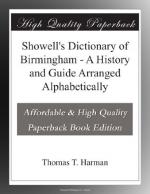Religious Tract Society.—A local auxiliary was established here in 1853 in which year L409 were realised, by the sale of books, tracts, and religious periodicals; in 1863 that amount was quadrupled; in 1873 the receipts were nearly L2,000. Last year (1883) the value of the sales reached L2,597, and, in addition, there had been free grants made of more than 13,000 tracts and magazines—the Hospitals, Lunatic Asylums, Workhouses, Police Stations, Cabmen’s Rests, &c., being supplied gratuitously.
St. John Ambulance Association.—The Birmingham Branch of this Association was organised in 1881, and some hundreds of both sexes have since then passed the examination, and obtained certificates of their proficiency in ambulance work, and in the treatment of ordinary cases of accident or sudden illness. It would be a good thing if every man and woman in the town had similar knowledge, and would make use of it when occasions require quick thought and ready hand. The secretary is Mr. J.K. Patten, 105, Colmore Row.
St. Thomas’s Day Charity.—A very old custom in Edgbaston has been the collection of donations for a Christmas distribution to the poor and old of the parish. Regular accounts have been booked for over fifty years, but how much longer the custom has existed is uncertain. At first, money only was given, afterwards part was given in bread and packets of tea, while of later years a stock of about 500 blankets has been provided for lending out. The receipts per year are about L200.
True Blues.—In 1805 a number of young men who had been brought up at the Blue Coat School and who called themselves the “Grateful Society,” united their contributions and presented that charity with L52 10s. 3d. in gratitude for the benefits they had received, a worthy plan which was followed for several years. These same young men originated the “United Society of True Blues” (composed of members who had been reared in the School) for the purpose of forming a fund for the relief of such of their number as might be in distress, and further to raise periodical subscriptions for their old school, part of which is yearly expended in prizes among the children.
Philanthropic and Benevolent Institutions—Birmingham cannot be said ever to have wanted for charitable citizens, as the following list of philanthropic institutions, societies, and trusts will show:—
Blind Institution, Carpenter Road, Edgbaston.—The first establishment in this town for teaching the blind was opened at 113, Broad Street, in March, 1847, with five boarders and twelve day pupils. At Midsummer, in the following year, Islington House was taken, with accommodation for thirteen resident and twelve day scholars, but so well did the public meet the wishes of the patrons and committee of the Institution, that the latter were soon in a position to take upon lease a site for a permanent building (two acres,




